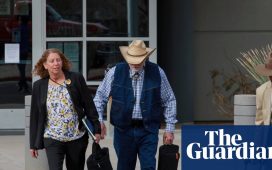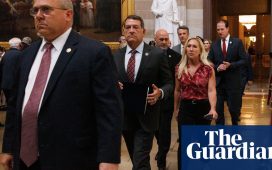A senior justice department official who has been nominated by Donald Trump to serve in a lifetime appointment as a judge was involved in the removal of a prosecutor in Texas in 2017 after he repeatedly raised concerns about migrant children who could not be located after being separated from their parents.
The incident, which was documented in private memos and emails seen by the Guardian, shows that a justice department prosecutor named Joshua Stern told colleagues he was “disturbed” by the separation of children from their parents after the Trump administration implemented a “pilot program” to criminally prosecute migrants who were entering the country illegally in the western district of Texas.
The policy led to the separation of about 1,550 children from their parents, hundreds of whom have still not been reunited.
Stern, a former marine corporal, was removed from his temporary detail in Texas in September 2017, about two weeks after an official there contacted Iris Lan, a senior official working in the office of the deputy attorney general in Washington, complaining that Stern was “somewhat difficult to deal with” and appeared to be “less than fully committed to the program”, according to the documents.
Lan, a respected career official whose work on immigration has not previously been reported in detail, has been nominated by the Trump administration to fill a lifetime seat in the district court of the southern district of New York, one of the most prestigious judicial appointments.
She has not yet been confirmed by the Senate but is described as highly competent and apolitical by some people who know her.
It is not clear whether Lan privately supported or criticised the administration’s child separation policy – or whether she believed it was simply her role to execute it in her job as associate deputy attorney general. However, her apparent involvement in Stern’s removal raises thorny new questions about whether longtime career officials in the Trump administration such as Lan fulfilled their moral and legal obligations when they helped administer the White House’s most controversial policies, including those that have since been deemed to be illegal.

“The country will hopefully never forget the horrors of the Trump administration’s family separation practice and eventually even career people will be asked what they did to prevent it,” said Lee Gelernt, a senior immigration lawyer with the American Civil Liberties Union (ACLU).
One person familiar with the matter said that Lan was also regularly invited to immigration meetings at the White House in 2017 and 2018 that were chaired by Stephen Miller, a senior White House official who is known to espouse white nationalist views. The DoJ declined to comment. The White House declined to comment.
The pilot program put in place in the western district of Texas in July 2017 called for the criminal prosecution of all migrants who entered the US illegally, including the parents of young children, in a region that included El Paso and parts of New Mexico. Under the Obama administration, such families were usually either put on parole to await their immigration hearings, or were detained together.
Defence lawyers who work in the western district of Texas told the Guardian that they were never formally alerted in the summer of 2017 that the US border patrol was changing tactics, but many noticed a sudden spike in arrests.
In an abrupt and noticeable change, lawyers said, migrant clients in that period were often hysterical and inconsolable because they did not know where their children had been taken.
Some lawyers described searching through their clients’ legal paperwork to find out where their children were, but not finding any acknowledgment or information about the minors. Hundreds of the children who were separated were under the age of five.
Attorney Rebecca Reyes recalled the moment in 2017 when she witnessed about 12 women who had been arrested for allegedly entering the US illegally being held in a single cell. All of them were crying.
“And I said ‘wait a minute, ladies, you are going to be in and out.’ And they are all crying and saying, ‘where are our kids?’ It was really emotional. In most of these cases, they [US law enforcement authorities] didn’t even document that they had come with children,” Reyes said.
The Trump administration’s “zero-tolerance” policy was extended to all southern border states in 2018. It led to the separation of about 3,000 additional children from their parents. The policy was ended six weeks later, when Trump – facing intense congressional and legal pressure – signed an executive order calling for the separation policy to end.
Emails seen by the Guardian show that a DoJ official in Texas named Jose Gonzalez sent a memo to Richard Durbin, the then-acting US attorney in the western district, in September 2017, which outlined concerns about Stern. He was one of about 20 “detailees” – lawyers loaned out to Texas from the Department of Justice in Washington – to assist in the prosecution of immigration cases.

Gonzalez claimed that some of the attorneys who worked with Stern were having to accompany him to court to ensure that cases he was handling were not getting “unnecessarily prolonged”. Stern, the memo said, was “particularly disturbed” by cases in which defendants could not locate their children, and was telling other prosecutors that he believed the parents in the cases were “often fleeing violence in their home countries”.
“He informed us that he contacted agencies so that he could assist the defense with the process to locate the children,” the memo said.
Durbin forwarded the memo to Lan and said in an email that Stern had been “somewhat difficult to deal with”. He added: “More important, his supervisors in El Paso have expressed concern that he is less than fully committed to the program. He seems to have some ambivalence about the government’s position in the misdemeanor immigration prosecutions and tends to raise defensive issues that the defense is not interested in.”
Durbin, who said his office lacked confidence in Stern, said he was seeking to release Stern from his detail and asked Lan whether that posed a problem to the DoJ in Washington. Emails show that Lan, who was responsible for the detailee program, said she was not sure about the “usual protocol” and wanted to share the memo with another colleague, Monty Wilkinson, and get his “take” before “we proceed”.
Wilkinson responded to Lan and Durbin, saying that he and Durbin had talked and that Durbin would send more “specific examples” to him.
Stern was sent a termination letter that ended his El Paso posting on 20 September 2017, two weeks after concerns were first raised with Lan and other officials in Washington. He is no longer working at the DoJ.
Stern declined multiple requests for comment. Lan did not respond to an email seeking comment.
A DoJ spokeswoman said: “Ms Lan received the memo because of her role as a liaison to US attorneys. She does not handle personnel matters. She did not review the memo and was not involved with the matter. She routed it, as consistent with her role.” The DoJ declined to comment on questions about whether Stern’s concerns about missing children were ever discussed by Lan or whether any action was taken at the time.
Families who were separated from their children on the southern border in 2017 or 2018 can find an organization that might be able to help here.







